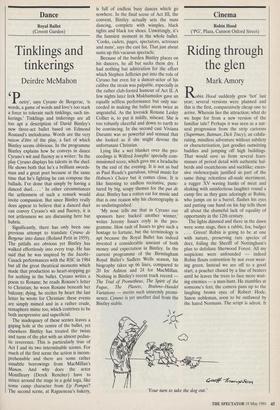Dance
Royal Ballet (Covent Garden)
Tinklings and tinkerings
Deirdre McMahon
Poetry', says Cyrano de Bergerac, 'is words, a game of words and love's too stark a force to tolerate such tinklings, such tin- kerings.' Tinklings and tinkerings are all too apt a description of David Bintley's new three-act ballet based on Edmond Rostand's melodrama. Words are the very raison d'être of the play, a fact of which Bintley seems oblivious. In the programme Bintley explains how he conveys in dance Cyrano's wit and fluency as a writer: 'In the play Cyrano displays his talents in the duel. He shows both that he's a brilliant swords- man and a great poet because at the same time that he's fighting he can compose the ballads. I've done that simply by having a danced duel. . . . ' In other circumstances the artlessness of such a remark would invite compassion. But since Bintley really does appear to believe that a danced duel can convey Cyrano's wit and fluency, it is not artlessness we are discussing here but hubris.
Significantly, there has only been one previous attempt to translate Cyrano de Bergerac into dance (Roland Petit in 1959). The pitfalls are obvious yet Bintley has walked effortlessly into every trap. He has said that he was inspired by the Jacobi– Cusack performances with the RSC in 1984 but all the great theatrical moments which made that production so heart-stopping go for nothing in the ballet. Cyrano writes a poem to Roxane; he reads Roxane's letter to Christian; he woos Roxane beneath her balcony; dying, he recites by heart the last letter he wrote for Christian: these events are simply mimed and in a rather crude, semaphore mime too, which contrives to be both inexpressive and superficial.
The inadequacy of these scenes leaves a gaping hole at the centre of the ballet, yet elsewhere Bintley has treated the twists and turns of the plot with an almost pedan- tic reverence. This is particularly true of Act I and its two interminable scenes. For much of the first scene the action is incom- prehensible and there are some rather unsubtle borrowings from MacMillan's Manon. And why does the actor Montfleury (Derek Rencher) have to mince around the stage in a gold toga, like some camp character from Up Pompei? The second scene, at Ragueneau's bakery, is full of endless busy dances which go nowhere. In the final scene of Act III, the convent, Bintley actually sets the nuns dancing, complete with wimples, black tights and black toe shoes. Unwittingly, it's the funniest moment in the whole ballet. `Cooks, cadets, pages, spectators, actresses and nuns', says the cast list. That just about sums up this vacuous spectacle.
Because of the burden Bintley places on his dancers, he all but sucks them dry. I had nothing but admiration for the effort which Stephen Jefferies put into the role of Cyrano but even for a dancer-actor of his calibre the strain was palpable, especially in the rather club-footed humour of Act II. A few nights later Irek Mukhamedov gave an equally selfless performance but only suc- ceeded in making the ballet seem twice as ungrateful. As the lovesick Roxane Lesley Collier is, to put it mildly, miscast. She is too robustly cheerful and down to earth to be convincing. In the second cast Viviana Durante was so powerful and sensual that she looked as if she might devour the unfortunate Christian.
Lying like a wet blanket over the pro- ceedings is Wilfred Josephs' specially com- missioned score, which gave me a headache by the end of the evening. It is not as bad as Paul Reade's garrulous, trivial music for Hobson's Choice but it comes close. It is like listening to endless recitative, punc- tured by big, soupy themes for the pas de deux. Bintley has a rotten ear for music and that is one reason why his choreography is so undistinguished. `My nose tells me that in Cyrano our sponsors have backed another winner,' writes Jeremy Isaacs coyly in the pro- gramme. How rash of Isaacs to give such a hostage to fortune, but the terminology is apt because the Royal Ballet has indeed invested a considerable amount of both money and expectation in Bintley. In the current programme of the Birmingham Royal Ballet's Sadlers Wells season, his biography takes up 66 lines, compared to 20 for Ashton and 24 for MacMillan. Nothing in Bintley's recent track record The Trial of Prometheus, The Spirit of the Fugue, The Planets, Brahms–Handel Variations — merits such unseemly promi- nence. Cyrano is yet another dud from the Bintley stable.


























































 Previous page
Previous page